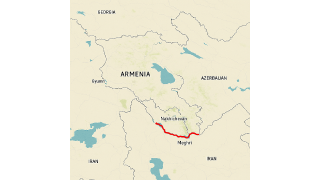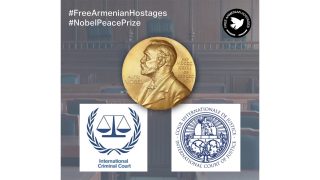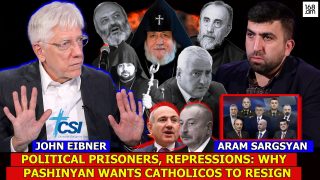
Azerbaijan Abortively Used Putin’s Card against Armenia
Interview with Stanislav Tarasov, Russian analyst, columnist at Regnum and Rex agencies.
Mr. Tarasov, what should we expect from the forthcoming developments of NK conflict, when Azerbaijani officials withdraw from the agreement reached in Vienna after Sargsyan-Aliyev meeting, referring to installation of investigative mechanisms on the Line of Contact? What’s your assessment to the meeting results?
To understand the situation, statements made by the officials should be observed. The officials including U.S. representative, RF MFA, Nalbandyan, Mammadyarov appeared with public observations, from which it became clear that the sides agreed on installation of investigative mechanisms. As German MFA Steinmeier told, Kasprzyk’s office will be expanded and will bear a permanent nature on account of the fact that the Line of Contact is rather wide, and a wider institute will be necessary. RF MFA stated that it refers phase-to-phase implementation of activities with the possibility to establish a peacekeeping corps. There is another component as well, which wasn’t mentioned after recent meetings, which was previously stated by Igor Popov: at a certain phase NKR should be involved in negotiations, meanwhile the Armenian side didn’t include the issue in the agenda, although the draft law on recognition of Nagorno-Karabakh appeared in the Government, discussion of which was postponed.
Suspension of the draft law discussion and Serzh Sargsyan’s departure to Vienna aren’t accidental, and it’s claimed that it was a planned step by RA president.
Yes, it raised certain questions. To all probabilities, Yerevan made a compromise regarding recognition and, in its turn, Azerbaijan agreed on monitoring mission on the Line of Contact. Thus, next meeting will be held in June, during which the Co-chairs should develop a legal ground, which will provide stability of monitoring system. It’s not clear whether they’ll succeed in making the document, or there may be anticipations that Aliyev has frozen the conflict until late June, as it’s interested in launching Formula 1. Maybe after the tournament a new wave of tension will be initiated. The fact, that ambiguous statements are heard by Azerbaijan on reached agreements, attaches attention. It refers Novruz Mammadov, who states that they agree on monitoring without observers. Such ambiguous statements were heard after the establishment of Madrid Principles as well. The point is, Azerbaijani diplomacy has failed after the April four-day war. They state that they have won, however upon diplomatic results they recorded a failure, thus it’s improper speaking of victory. It’s also noteworthy that Vienna statements were made under sharp pressure of MFAs of OSCE MG Co-chairs. Obviously it has been in the form of ultimatums.
This constant tension on the Line of Contact, as paradoxical it may seem, hits Azerbaijan, as the latter’s energy projects appear under threat. Azerbaijan isn’t able to finalize those projects, which it widely states, as not a single country and side in the world will invest resources in geo-political geo-economic energy projects in a zone, where systemic fighting is ongoing. That is, for some countries oil is wealth and for some—a disaster. Surprisingly enough, Armenia is poor in natural resources, however appears in a more beneficial condition, than Azerbaijan, projects of which appear in danger in this situation. The West has led Aliyev into a deadlock and attempts to raffle economic and energy cards. In its turn, Azerbaijan attempted to use Putin’s card, statements were made that Putin leaves for Baku, the plane is already ready, however it’s a bluff, through Russia’s mediation they also attempted to pass a legal sense to the statement made by chiefs of general staffs of Armenia and Azerbaijan, that 1994-1995 agreements are not in force any more, it was also a bluff and an information trap. MG Co-chairs are acting by a tandem, and I have an impression that under this situation implementation of refreshed Madrid Principles will be touched upon, however, it’s a question, whether it’s beneficial to the Armenian side, as here return of some lands and providing Karabakh a special status is being touched upon.
What’s your assessment to Russia’s positions in this process, which, according to some opinions, is losing its role of a leader in the settlement process?
We are acting by a tandem. When Putin left for Sochi, to meet Aliyev and Sargsyan after the downing of the helicopter, he didn’t say a single word; he urged to take the way of OSCE MG of signing a peace agreement. Azerbaijan was raffling a card, that Russia has its plans, there is a “Lavrov plan,” however, when the Armenian side told there is no such a plan, and there is an issue of return to Kazan document, Putin behaved rather properly and competently, kept distance, only reached to ceasefire not at presidential level, but that of chiefs of general staff. And then he didn’t interfere, as Russia is in a few peaceful processes with the USA—Minsk process around Ukraine, Geneva process around Syria, and many other different processes, from which—Karabakh. We won’t fail that tandem.
There is a curious issue, which may seem primitive, however, it’s much discussed in Russian and Armenian media outlets. It refers to the fact that Lavrov was standing next to Sargsyan in Vienna, and this was qualified as a diplomatic hint. What do you think of this?
These are special and clearly considered nuances in diplomacy. Russia’s MFA was sitting next to Armenia’s president, as it’s the latter’s strategic ally, Armenia is a EEU member country, Russia has some dispositions agreed with Armenia, there are disagreements, however, regarding base components Armenia and Russia are associates. Azerbaijan’s president was sitting next to the representative of France, and Kerry, as a peacemaker, i.e. as a tamada, who assumed the role of a separator, but not that of a leader. This was a demonstration who the decision-makers are.
Mr. Tarasov, to your assessment how did Armenia overcome the four-day war and its implications? With what results does it come out from the situation?
The fact that Sargsyan dismissed some servicemen means that there are issues in the military field, however, there are clever people at the office, they have matured in that process, it’s not their first year and they know all the nuances. They are pushed from one side to the other in case, when Armenia is pursuing a consistent policy. On the one hand, they intended to engage Turkey with the settlement process, and Germany on the other, and the latter put forward its own scenario, which is not beneficial for Azerbaijan, the Americans are no beneficial for Azerbaijan either, they say all the keys are in Moscow, and Moscow says—no, keys are in hands of OSCE MG. Thus, they have separated Azerbaijan’s energy resources and Karabakh process. Azerbaijani diplomacy wasn’t able to convert its resources into the politics, and the Armenians, by having nothing, were able to maintain their positions. It’s a fact.
By Araks Martirosyan























